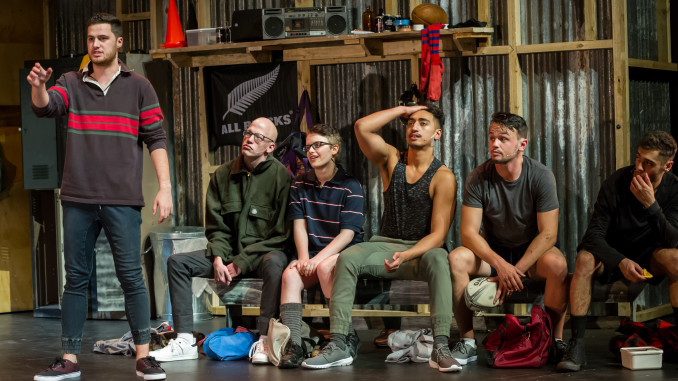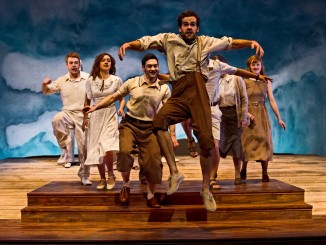
[Torn Foreskin]
Having premiered originally in 1980, Greg McGee’s Foreskin’s Lament might be the quintessential Kiwi drama, putting our nation’s favourite sport under the microscope. Despite its reputation, it lives in a state of antiquity like most of the New Zealand theatre canon, sitting on the shelves often to be appreciated rather than performed. While it would be interesting to see how Foreskin’s Lament translates into a 2017 context, co-directors Eleanor Bishop and Julia Croft have done more than simply update the text. Instead, they’ve taken the dramaturgical scalpel to it and pulled it apart, filling up the subtexts and absences with their own pressing concerns. The resulting play, adapted by Bishop, is simply and aptly named Boys.
The first act is what you might expect from a straightforward update of Foreskin’s Lament moving the play into the present day, filled with contemporary language and references, and bringing to mind the term ‘locker room talk’. While this approach would likely be a respectable production, showcasing the play’s timelessness, it’s the subsequent deviations that are the most satisfying and arresting. As the males leave the stage of the first act, with only their dirty laundry scattered across the locker room, the play turns inside out. We’re suddenly and unexpectedly ushered into the realm of postmodernism.
In the second act the politics and intentions behind Boys becomes much clearer. The traditionally male space of the locker room is cleared out as the female ensemble take their place. Goodbye to the men, goodbye to the set, goodbye to naturalism. For all intents and purposes, goodbye to Foreskin’s Lament. The play is put on pause and, acting as judge and jury, the new cast analyse real-life examples of toxic masculinity and rape culture in action. While audiences might expect allusions or references to Tony Veitch, the Chief’s stripper scandal or John Key’s ponytail pulling, the outright directedness in how they’re addressed in Boys is often startling and outrage-inducing. The very language of slut shaming and victim blaming is dismantled and highlighted, as well as the often damaging phrases and excuses used to defend them.
The last section of Boys returns to the final act of Foreskin’s Lament, though heavily deconstructed. Set in the aftermath of a fatal rugby incident, we see glimpses of the original play, as the actors scrutinise their characters and they fall in and out of character. Eventually, the play, the characters and the cast clash, struggling to resolve their own ideas with the play’s myriad issues. What has the death of a teammate got to do with sexual violence? What has Foreskin’s Lament got to do with rape culture? Well, everything.
The liberal-leaning and university educated Foreskin might be the relatable audience-friendly figure of the original play, and likely the male that most would find themselves identifying with. But in Boys, he isn’t excused for his complicity either. Boys rejects the romanticising of male pain and Foreskin’s original lament. Played by Matthew Kereama, he acts as the perfect audience surrogate for every man who’s ever thought he was not part of the problem. The rest of the cast are equally impressive, giving performances of varying styles. The males are asked to inhabit blokey caricatures of masculinity to scary success, with Arlo Green and Kyle Shields being particularly recognisable figures. The female cast members play versions of themselves, refusing and resisting the often two-dimensional roles they’re forced to play. Bronwyn Ensor’s presence as the voice of reason, uncomfortably wrestling with the role of Foreskin’s token female Moira is also fascinating.
If the play sounds oppressively didactic, it avoids this by feeling by being necessarily-handed rather than heavy-handed. A sense of urgency underscores the politics of the play. This is unabashedly feminist theatre, informed by social purpose rather than reverence. But, for all its potential finger-wagging, it makes it clear that there is no sole perpetrator or victim.
While the postmodern techniques don’t pose an immediate problem to those familiar with Foreskin’s Lament or theatre in general, it’s hard to shake the feeling that the audience who most need it – young males indoctrinated into a culture of toxic masculinity – aren’t likely to be the ones watching it. That maybe a deconstruction of an old Kiwi play might be slightly too niche, no matter how well executed it is.
As part of Here and Now (previously known as The Next Big Thing), Auckland Theatre Company have produced a work that succeeds on multiple levels: firstly, as a performance vehicle for the young actors, which doesn’t lazily rely on the scale of the ASB Waterfront Theatre. Secondly, it speaks directly to its cast on a deeper more personal level – it is their story, not just simply some story. Thirdly, it challenges our notions of remounting a Kiwi classic, taking something that could be a by-the-numbers production and bringing it straight into the 21st century.
Boys takes Foreskin’s Lament and slices the Kiwi classic into a postmodern maze of modern masculinity, each act digging deeper into our collective psyches. It begins with a straight-up adaptation of Foreskin’s Lament before digressing into an examination of rape culture, and finally tying the two ideas together with the foundation that is toxic masculinity. It’s a highly intellectual deconstruction, resembling what might be considered the European school of director’s theatre crossed with a form of devised theatremaking involving the entire cast. Unlike Eli Kent’s Peer Gynt [recycled] which worked due to the tension created between the two playwrights (Kent and Ibsen), the narrative of Foreskin’s Lament doesn’t exist in collaboration with Boys so much as get torn by it, but what remains is as vital and urgent as the original, evoking anger and empathy in equal measures.
The final moments of the play are its most telling, where the males are stripped bare of their characters, leaving them totally vulnerable. Amidst the wreckage of real-life pain, they offer a series of redemptive anecdotes. Tiny acts of humanism with their partners, families and friends that suggest the little wars and everyday victories are what makes a difference.
Boys played at the ASB Waterfront Theatre 21-24 April as part of the Here and Now Festival. Details see ATC.




Leave a Reply